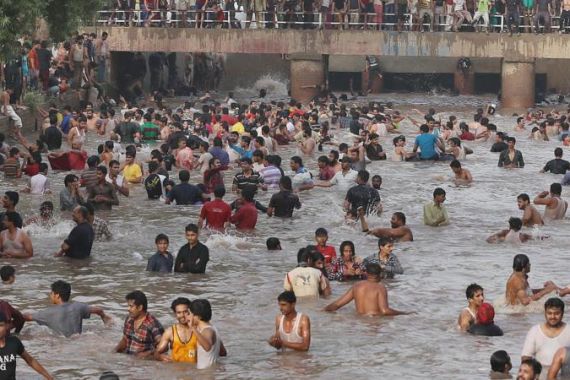Report: Heatwave impacts to quadruple by 2040
The coldest summer months by the end of the century will be hotter than the hottest experienced today in many regions.

The areas of the world hit by heatwaves are set to double in size by 2020 and continue to grow in coming decades, as heat-trapping greenhouse gases warm the global climate, scientists in Germany and Spain said.
The projections, based on new computer models and reviewing what the scientists said was an “exceptional number of extreme heatwaves” in the past decade, are more alarming than the conclusions of the UN panel of climate scientists last year.
Keep reading
list of 4 itemsWorld’s coral reefs face global bleaching crisis
Why is Germany maintaining economic ties with China?
Australia’s Great Barrier Reef suffers worst bleaching on record
“This is projected to double by 2020 and quadruple by 2040,” the scientists wrote of their new study in the journal Environmental Research Letters on Thursday. There will be a “several-fold” increase in heatwaves up to 2040, regardless of how much carbon dioxide goes into the atmosphere.
The tropics would be most affected by increased heatwaves, followed by areas including the Mediterranean, Middle East, parts of Western Europe, central Asia and the US.
“In many regions, the coldest summer months by the end of the century will be hotter than the hottest experienced today,” unless emissions of greenhouse gases are curbed, said the study’s lead author Dim Coumou, of the Potsdam Institute for Climate Impact Research.
The report by the Intergovernmental Panel on Climate Change (IPCC) – the UN body that collates scientific research from around the world – merely said of heatwaves: “It is very likely that the length, frequency, and/or intensity of warm spells or heatwaves will increase over most land areas” this century.
Monthly heat extremes in summer – such as the heatwaves in Australia this year, parts of the US in 2012 or Russia in 2010 – now affect five percent of the world’s land area, the report said.
The IPCC says heat-trapping gases, mostly from burning fossil fuels, are nudging up temperatures, and are likely to cause more severe downpours, heatwaves, floods and rising sea levels.
Famine, politics, migration…
Al Jazeera weather forecaster Richard Angwin says, “Many people still view heatwaves as a good thing. Let’s face it, after several extremely poor summers who can begrudge Europeans for reveling in the long, hot summer of 2013. But it was exactly 10 years ago when a major heatwave hit Europe causing around 70,000 excess deaths.”
“Leaving aside the physical stress caused by dealing with prolonged hot weather, heatwaves have major implications for agriculture, energy and water resources. In poorer, less developed parts of the world famine, political tensions and migration can all result from heatwaves.”
Almost 200 governments have agreed to limit global warming to less than 2 degrees Celsius (3.6 Fahrenheit) above pre-industrial times and plan to agree, by the end of 2015, a deal to curb greenhouse gas emissions. Global average surface temperatures have risen by 0.8C (1.4F) since the Industrial Revolution.